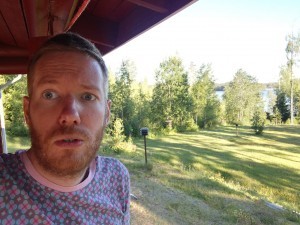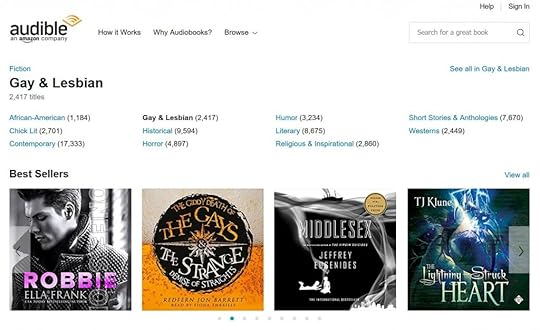Redfern Jon Barrett's Blog, page 4
May 4, 2021
ParSec Magazine and Berlin's Schwules Museum
So I’ve been informed that my upcoming story for ParSec Magazine, ‘We Have Forever’, is going to feature in its very first issue — alongside some fantastic names in science fiction, including Ken Macleod, Dan Abnett, and Esther Friesner! It’s really an honour to be included, and you can buy a subscription to PS Publishing’s newest venture here.
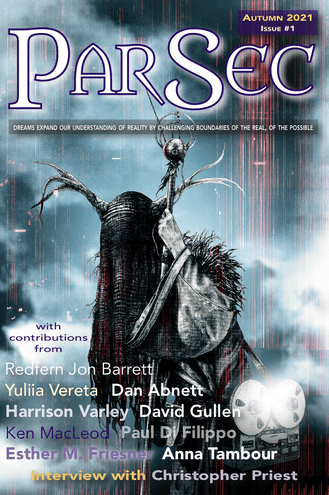
Not only that, but the Queer Futures and Future Queers panel discussion, organised by Berlin’s Schwules Museum (Gay/Queer Museum), went extremely well. I was fortunate enough to talk about queer themes in Star Trek, and speculative fiction in general, with writer and editor Eleanor Tremeer, professor David Greven, and podcast host Heather Barker – with the Schwules Museum’s Heiner Schulze presiding. The video can be watched here.

I know this is teasery, but I have some wonderful news to share very soon – later this week, even…
Until then!
- Redfern
April 27, 2021
Spec fic, Star Trek, and lipstick selfies
This has to be the quietest global crisis so far, because the past couple months have mostly centred around reading old science fiction magazines, watching documentaries about murderers on Netflix, and playing Disco Elysium (genuinely the most well-written game I’ve ever encountered). I’ve also been experimenting with different lipsticks, because changing the colour of my lips on a whim is a superpower I’ve been denied long enough.

Not only that, but the ever-lovely Alex Goldberg and I stumbled to Kreuzberg’s Bethanien amid ice and snow in order to take my new author photo, which can see seen on the main page of my site. Here’s an unused shot which reveals that I’m actually wearing a thin shirt with the sleeves rolled up, in the middle of winter. Like a genius.

There’s also exciting news: this Friday I’ll be part of a panel discussion on queerness and Star Trek organised with the Schwules Museum (Gay Museum) Berlin, along with Eleanor Tremeer, David Greven, and Heather Rae:
“Star Trek has been one of TV’s groundbreaking series, representing a utopian future, breaking down racial barriers, inspiring countless kids and adults. Taking one of the most well-known Sci-fi franchises into focus this panel wants to discuss the role and representation of queer people and subjects in Star Trek, and the role Star Trek can play for transcending 20th century gender and sexual norms. It wants to look critically on queerness in Star Trek and questions if Star Trek’s failure to represent queerness undermines its utopian future.
The panel brings together a group of Star Trek aficionados with their own perspectives on the franchise: Eleanor Tremeer is an editor and journalist and has written extensively on gender and queer issues in Star Trek. Redfern Jon Barrett is a British-German Sci-fi writer and polyamorous role model. David Greven is professor of English Language and Literature at the University of South Carolina, author of “Gender and Sexuality in Star Trek: Allegories of Desire in the Television Series and Films“. Also joining will be Heather Rae, podcaster and longtime Star Trek fan. Heather is also co-creator of the #WomenMakeTrek project.”
As is probably to be expected, I have a lot of thoughts. The event can be streamed on Facebook (ugh) at this link.

But that’s not all — I’m pleased to announce that my writing will be published in a new magazine from PS Publishing, tentatively titled ParSec. When it comes to speculative fiction, PS Publishing have made a significant name for themselves in the 22 years they’ve been operating, and I’m more than a little excited to be included.
Other than that, I currently have quite a few things sliding along the Conveyor Belt of Overwork, and I’ll be sure to announce them here. Until then I’ll be hiding indoors, glaring at strangers through my window.
Happy spring!
- Redfern
October 30, 2020
Richard
I don't even know what to write. But you're gone and Samhain is almost here, so I have to write something. You marked so many festivals, but this was special. This is the time for campy, kitschy, clashy trinkets. The time for the dead.
Your postcards still adorn my walls. Your books line the shelves. But most of all, there are those trinkets. Devil masks and candy hearts. Vintage tins and finger puppets. Plastic ghosts.
Your love came in pieces.
Now I dwell on how much those small things weighed. After all, you never liked fuss. And because you didn't like fuss, there are things I never told you.
I never told you I look up to you.
And that's important. Sensitive queers have few role models, and I was lucky to have one as a friend. You meant a lot to me. You still do. You always will.
So that's my fuss. I will never forget you, you grumpy Gen X cynic. In fact, there's a piece of you I'll always carry with me. A Richard-shaped trinket.

RM Vaughan was an outrageous and insightful writer. I was honoured to write the blurb to his insomnia book Bright Eyed, but I recommend reading any of his works – he was one of those rare minds who could truly see our world from its outside. He deserves to be remembered.
October 6, 2020
Here's an adorable thing...
I was very pleased to be sent this image of a fridge magnet someone made of my novel The Giddy Death of the Gays & the Strange Demise of Straights. Also I’m extremely impressed that they managed to fit that title onto something so small.
I’m truly flattered that so many people seem to have connected with the story. I’ve been hearing from students who are studying the book at UAB, alongside some of my favourite writers such as Jeanette Winterson and Walt Whitman. It means a lot to me.
- Redfern
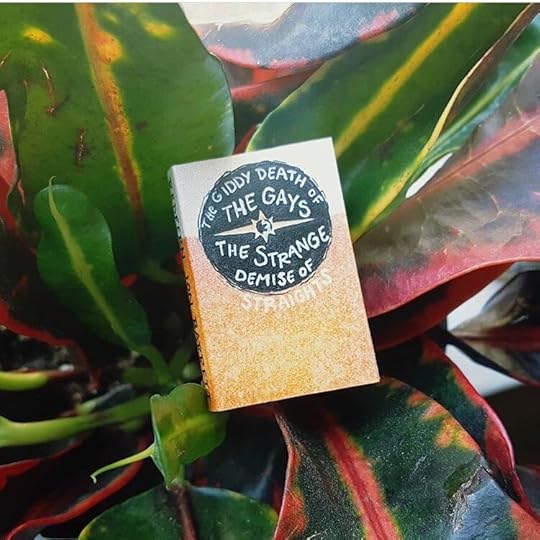
September 16, 2020
Now Everyone Else Is Locked Inside Too
As 2020 is apparently the year everyone else decides to shut themselves away in their homes, I’d like to take this opportunity to say that I and my workaholism got there first, before being a hermit shut-in became fashionable.

I was also using old-timey telephones and wearing a mask before it became fashionable.
That said, things have been happening in the world outside my desk, and I list them here in no particular order:
First of all, the German government made a terrible, terrible mistake and granted me citizenship! Which means I am now both British and German, or Germish.
In other changing-labels-news, I now identify as non-binary. I’ve been using “they” as a pronoun for a while, mostly because I think it’s weird that we need to constantly reference people by their gender, which I explore in my short story ‘They’. (Of course I respect whatever pronouns people like.) This doesn’t actually feel like very big news, as it’s just updating a label to catch up to how I’ve already felt, but it’s on my blog which means it’s official.
So I’m a non-binary Germish giant (I’m 198cm/6’6” tall). That ought to give the far-right something new to get all outraged over. Never say I’m not a giver.
Reviews! Interviews! Overviews! (That last one might not be a thing.) There’s CloudCuckooCountry’s Youtube review of my novel The Giddy Death, and a full interview with your favourite non-binary giant here.
Last week I spoke with the ever-wonderful SA Collins and Vance Bastion for the WROTE literary podcast, which can be listened to in a whole buncha places, including Apple Podcasts, Google Play, and Spotify, among others.
My flash fiction piece ‘Just Perfect’ got an honourable mention in Queer Sci Fi’s Flash Fiction Contest, and is featured in their latest anthology. It’s speculative horror, which I’ve never written before, and I had a great deal of fun with it.
My short story ‘Shelter’, which explores a Berlin bunker across a century of history, was reprinted in Stadtsprechen magazine, a multi-lingual, Berlin-based publication.
A language-learning calendar I wrote, Speak Like a Native, was published by the German publisher Harenberg.
I’ve also had some shorter nonfiction published, which you can find on my nonfiction page.
I have a couple of major projects and possible announcements coming up, so be sure to sit there endlessly refreshing this page for the latest news.
And with that, I bid you a traditional Germish farewell! Until next time, and remember, DO NOT GO OUTSIDE UNDER ANY CIRCUMSTANCES. It’s only full of other people anyway.
- Redfern
April 21, 2020
Cold War Queers: Same-Sex Love Across the Berlin Wall
Berlin is one of the queerest places on Earth, and for half a million LGBT+ people Germany’s capital provides a refuge from a doggedly intolerant world. It’s also a city with a dark and troubled history, particularly when that history includes queer sex. Though focus is often devoted to the pink triangles and murderous hatred of the Nazi era, the ruins of the Third Reich and rising Iron Curtain posed particular problems for Berlin’s sexual minorities. At the dawn of the Cold War queer people found themselves at the centre of a new battleground.
Two new countries staggered from the rubble of World War II, and with them two Berlins: one dominated by Allied forces, the other the Soviet Union. Each had a vision for the future, each had its own economic ideology, and each was governed by a savage homophobia. Both the Federal Republic of Germany and the German Democratic Republic fought to prove themselves more ‘moral’ than the other, with capitalist and communist authorities each claiming the healthy heterosexual family to be the foundation for their society.
In the East the German Democratic Republic maintained a rigidly straight workers’ paradise. Though the laws of the Third Reich were abolished as part of its de-Nazification programme, the state retained Paragraph 175, the statute which had criminalised homosexuality for almost 80 years—including any act which “violates the moral sentiment of our workers.” If caught both men and women were published for ‘lewd’ behaviour, though fervent campaigns by rights activists meant the law’s enforcement was short-lived: prosecutions ceased after 1957.
It may sound surprising, but the legal situation was worse for queers living in West Berlin. Whereas the secular communists denounced homosexuality as bourgeois decadence, the more religious capitalists focused on sin: “Concerning male homosexuality, the legal system must, more than in other areas, erect a bulwark against the spreading of this vice, which otherwise would represent a serious danger for a healthy and natural life of the people.” Homosexual behaviour was officially deemed ‘propaganda’, and with the Parliament dominated by conservatives—the most prominent being the devoutly Catholic Chancellor, Konrad Adenauer—Paragraph 175 not only remained in effect, but it was the Nazi version which was enforced. Homosexual Westerners had to be extremely careful: several judges had held positions in the Third Reich, and in the 24 years following the end of the War 100,000 men were prosecuted and 50,000 imprisoned. Many were concentration camp survivors; suicide was common.
As bad as things were in the West, things were no easier for queers in the Eastern half of the city. Though adult homosexuals were no longer legally punished, the government used extralegal means to intimidate them. As one of the most extensive secret police agencies in the world, the Stasi employed legions of spies posing as potential lovers. Queer men and women were blackmailed from jobs, government positions, and even into exile. Love in East Berlin came at great personal risk—the city was crawling with informants.
The media gleefully took part in this harassment: when a young man named Günter Litfin was shot dead while trying to cross the Berlin Wall in 1961, the Neues Deutschand newspaper wasted no time in denouncing him as a deviant homosexual, mocking his memorial and referring to him as “Dolly” (a common homophobic nickname for male sex workers). Yet the media on the other side of the Wall was equally homophobic—in particular Axel Springer’s newspapers, whose high-rise headquarters on Berlin’s Kochstrasse stood as a symbol of the capitalist world.
Things weren’t to improve until the late sixties, with a new generation reaching maturity. Homosexuality was legalised in the East in 1968, and the West In 1969. West Berlin became a magnet for protests and counter-cultural movements which provided (limited) space for queer liberation. Magazines were launched and sympathetic films released—including 1971’s It Is Not the Homosexual Who Is Perverse, But the Society in Which He Lives. Following the example set in the United States and Britain after the Stonewall Riots, West Germany began to see the rise of of gay rights organisations, including Homosexuelle Aktion Westberlin. The district of Schöneberg—which had been the world’s first gay village before Nazi rule—thrived once more.
Though on paper legal rights were still more favourable in the East, the powerful system of censorship halted attempts to create gay and lesbian magazines, books, and films. People drank and danced in gay bars like their Western cousins, but they continued to be infiltrated by Stasi informants. Queer Easterners maintained strong communities, often far more intimate than those across the border, but change came slowly. In 1987 the Supreme Court announced that, “…homosexuality, just like heterosexuality, represents a variant of sexual behaviour. Homosexual people therefore do not stand outside socialist society...” Two years later Coming Out was released, the first and only East German gay film, shot at various bars around East Berlin. Harassment and intimidation continued, but by 1989 the communist state was first to equalise the age of consent. The law remained even after the Wall fell five months later.
The tensions between East and West Germany held the world’s focus for decades. For many it can be tempting to idealise a side—praising the ‘equality’ of the East or the ‘freedom’ of the West—but in reality queer Berliners experienced neither. A militant heterosexuality formed the foundation of each state, with homosexuality used as propaganda to show the ‘deviance’ of the other. As a result the language surrounding sexual minorities was eerily similar in both the capitalist and communist worlds, even when the punishments differed. A backlash began when the generations shifted, but for much of the Cold War queers lived under a totalitarian regime—no matter which side of the Iron Curtain they found themselves.
November 25, 2019
The End of the Tens
With just over a month before we hit the 21st century’s third decade, I thought I’d take a quick look back at a few things that happened in 2019. Good things. Things that aren’t hiding myself away in a neon-lit room, feverishly pounding away at my laptop like I’m trying to appease the furious gods of the Protestant Work Ethic. Stuff like…
Short stories!
First up, we have my speculative short story ‘Bricklets’, which was published in Booth’s 13th print anthology.
”They’d kept afloat, just about; they hadn’t realised they were drowning—that they were all drowning, in stress and car exhaust and meat. Sometimes the thing least visible is the thing most around. A house so flimsy the wind could knock it down.”
‘Brickets’ follows Mr. Beard, a traumatised survivor rummaging through a ruined Disneyworld park, as he carries around a bricklet of his husband’s body. It’s a fun story that plays with some of my deepest fears, so check it out online or prove your devotion to me by buying a precious, precious print copy.
I’m still thrilled that ’Shelter’, a historical story set in Berlin’s Reichsbahnbunker, was published in the 40th annual edition of Passages North.
”Think of what is lost, for it’s always something. Even when we cannot see it. Even when we do not want it.”
Set in 1943, 1972, 1994, and 2018, ‘Shelter’ follows the lives of four of the bunker’s inhabitants, as it’s transformed from a Nazi air-raid shelter, to a communist food storage facility, a nightclub, and finally a private art collection — each reflecting an epoch of Berlin’s modern history, from the hopeful to the deeply disturbing.
Another speculative story, ‘Closure’, was published in issue 02:02 of Yes & No magazine, after making the longlist for the Royal Acadamy/Pin Drop Short Story Award. It’s accompanied by a fantastic illustration by Simon Foxall.
My flash fiction story ‘They’, published in Crack the Spine last year, has been selected for their upcoming print anthology (release date still to be announced).
Interviews!
I can prove that I have had at least some human contact in 2019, because I was recently interviewed by Nicholas Kameniar-Sandery for The Informer on Joy 94.9 — Australia’s only LGBTQI+ radio station, where we talked about inclusion and gatekeeping in queer circles:
Redfern Jon Barrett on standing up for everyone in our community
Not only that, but in September I was also interviewed by the delightful Daniel Aldridge for Rainbow City on Radio Alex, a Berlin-based station, where we talked about my novels, my experiences of polyamory, and that ever-widening sinkhole named Brexit. The interview is available in English with a German transcript.
Other stuffs!
I’m still reviewing for Strange Horizons, and recently had the opportunity to explore Stronger, Faster, and More Beautiful by Arwen Elys Dayton — which, as an obsessive fan of speculative social fiction, was exciting. At least at first.
The full review can be viewed here.
I’m really pleased that my theory of ‘Ambitopia’, as I described in this Gizmodo article by the ever-excellent Eleanor Tremeer, really seems to be sparking imaginations, prompting discussion from the Netherlands to Japan. I’ve even been working on some ambitopian fiction, so stay tuned (or, in less romantic 2019 terms, “stay connected to this blog via an RSS feed”).
And with that we bring 2019, and the Tens, to an almost-close. While we may mourn for a decade which brought us so much exciting existential dread, we can at least look forward to what will surely be an action-packed 2020s. In the very least there may be a new novel hurtling toward us…
- Redfern
October 18, 2018
Why I love Margaret Atwood
In “The Handmaid’s Tale” there’s a scene in which the main character’s mother takes her to a book burning. The books burned are pornography, and the event is co-organised between the far right and radical feminists. The scene, missing from the TV show, makes an important point: Though the radical feminists believed they were fighting patriarchy, their unholy alliance with fascists proved their undoing, and paved the way for the misogynist state of Gilead. In short, Margaret Atwood is showing the reader that the enemy of your enemy is not your friend.
This scene is only broadly fictional. In reality, some radical feminist groups did team up with the far right in their fight against pornography. It was an action roundly criticised by other feminists, who rightly argued that it was morally repugnant and harmful to the cause.
I mention this because even though “The Handmaid’s Tale” was published 33 years ago, its message still holds true. There are groups of radical feminists (commonly labelled ‘TERFs’) who are siding with the far right in opposition to the lives and identities of trans people. It’s all too common – Janice Raymond has collaborated with Jesse Helms. Julie Bindel has been praised by Milo Yiannopoulos. TERF groups have worked with Northern Ireland’s extremist DUP. They disrupt LGBTQ Pride events and fragment the liberal left. They get praise from fascists.
I don’t believe groups of radical feminists actively want to help the far right, just as they didn’t in Atwood’s novel. But in aligning themselves with the devil, they only help the devil’s cause. Their actions wind up harming the very women they’re trying to help.
I love “The Handmaid’s Tale”, and though the book-burning scene is brief, it contains important messages for our own time. So think about who your allies are. Think about your impact in the long term. And more than anything, never side with fascists.
Thanks for reading. In love, hope, and solidarity,
Redfern ❤️
The post Why I love Margaret Atwood appeared first on redjon.com.
July 24, 2018
Still Alive: An Update
So you might have noticed that my blog has grown neglected over the past year, but there are reasons. Very, very satisfactory reasons. For one, I’m not sure anyone is still reading blogs, which is a shame, because they’re a marginally less stressful form of entertainment than reading about looming nuclear war / the ever-present threat of fascism on social media. For another, I have been working. And by ‘working’, I mean ‘writing’. And by ‘writing’, I mean ‘incessantly googling myself’. We all have to fill time.
But I have been accomplishing things this past year. Writing things. I present them here in no particular order, because life is chaos and we could soon be dead. Yay!
Short Stories
So I dedicated much of 2017 to writing short stories, and it’s been paying off. My works have been accepted in publications I couldn’t have dreamed of a few years ago, and I’ve even managed to put aside my existential fear for a few minutes in order to feel honoured. Flash Fiction Online will soon be publishing my story ‘Delivery’ – a sticky, slippery tale of fast food and revenge – while the eminent Passages North will be featuring my story ‘Shelter’ in their 2019 issue.
Some stories have already been released. My flash fiction story ‘They’ – set in a world where pronouns are based in race, rather than gender – appeared in Issue 236 of Crack the Spine. My story ‘Nice Men’ deals with queer homelessness, and featured in The Jellyfish Review. Another flash work, ‘Alif’, was published in Queer Sci Fi’s Renewal anthology.
Finally, my story ‘Beneath Our Feet’ came out in The Sun literary magazine just this week. You can read it here.
Awards (almost!)
My story ‘Closure’ was longlisted for the Royal Academy / Pin Drop Short Story Award, alongside writers I really respect and admire. You can read about it here.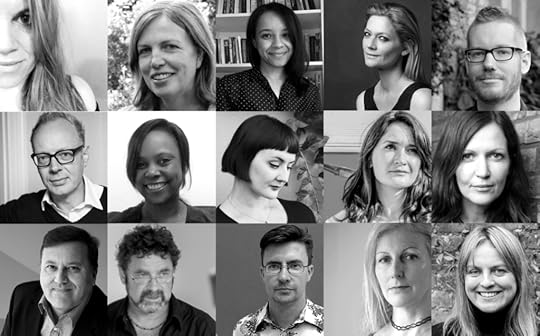
I also made the shortlisted for Scotland’s HISSAC prize, and was longlisted for the Cambridge Short Story Prize, as well as The Inktears Flash Fiction Contest!
Nonfiction
I’m pleased to report that I’m still reviewing for Strange Horizons. Late last year I actually had two books to review at once, and they wound up being both my most positive and most negative reviews. Cory Doctorow’s sci-fi novel Walkaway was everything I wanted it to be. Sadly Not So Good a Gay Man wound up being Not So Good a Gay Memoir.
Sticking with Strange Horizons, I also contributed to the 2017 Year in Review:
“It’s not been an easy 2017. In fact, the past months have played all the tropes of a serialised dystopia: far-right factions have assumed high government positions, global oligarchs hurl nuclear-tipped insults to one another, and corporations continue to monitor our private conversations yet are still unable to deliver ads for things we actually want…”
Other Happy Things
I was absolutely overjoyed to see that my novel The Giddy Death of the Gays & the Strange Demise of Straights made it to the top of Audible’s Gay and Lesbian bestseller list in March, putting the audiobook right up there with Jeffrey Eugenides and Armistad Maupin.
The audiobook also received a fantastic mention in Paste Magazine’s ‘Ten Audiobooks to Listen to During Pride Month (and Beyond)’:
“The title of this queer Welsh romp is reason enough to download it right now. Redfern Jon Barrett’s The Giddy Death of the Gays and the Strange Demise of the Straights is, in both execution and audio narration, an absolute joy. Nothing is sacred here—not gender roles, not sexualities, not romance, not monogamy, not clubbing culture and certainly not the strictures of the English language, itself—and narrator Fiona Thraille throws herself into every sacrilege with fearless Swansean aplomb. It is truly impossible to describe this book in a way that does it justice; just download it immediately.”
The Giddy Death of the Gays & the Strange Demise of Straights is also being taught about on Queer Lit courses and, so I’ve heard, discussed at conferences. So that’s exciting! And speaking of conferences, last August I presented a paper entitled ‘“Greedy, Deviant, and Perverse”: Living and Writing Polyamory’ at the Nonmonogamies and Contemporary Intimacies Conference in Vienna.
Not to be left out, my Sci-Fi novel Forget Yourself got a fantastic review at The Lesbrary:
“It’s speculative science-fiction unlike any I’ve read before … it also left me thinking in a way that very few dystopian novels ever have.”
This last item isn’t so much to do with my writing, but I was interviewed by The Atlantic about Brexit (one of my favourite man-made disasters). You can read it here.
So that’s it, a whole year of my life condensed into a few short paragraphs. For more information about me and my antics, be sure to check the violent crime reports for the Berlin area. But otherwise, until next time!
– Apocalypsefern
The post Still Alive: An Update appeared first on redjon.com.
June 8, 2017
Tired of Elections? We’re Here to Help
Elections got you down? Too much talk of Brexits, failing hospitals, and who will be fastest to annihilate humanity in a global firestorm of nuclear armageddon?
You’re not alone.
We at Redfern Enterprises are sick of it too. We may be a multinational conglomerate devoid of ethics or empathy, but we’re just like you—an average human who is sick of all that fighting among politicians. A normal person who sometimes buys bread and who is tired of having to deal with complex issues.
After all, we’re both just regular homosapiens/vast corporate entities.
Just look at the last couple of years: election after election after election. It’s not like the good old days, is it? Think of those—jolly old Henry VIII didn’t bother you with voting booths and party political broadcasts. It was a happier, simpler time. Don’t you just want a simpler time, when things were simple?
Besides, it doesn’t matter which “party” they’re from. They’re all lying to you, feeding you little snippets of dishonesty just so you’ll put a little X in a box next to their name.
We don’t want you to put an X in a box next to our name. How ridiculous! We just want your money. We’re honest about that. We want your money so you can have things. Nice things. Things that will make that awful man next door shake with envy. Because we’re on your side. And our side. But also your side.
Our products are always here for you. They don’t squirm and beg for your vote. They don’t need it.
It’s been stressful. We know that. But we can help remove your stress, whisk away the pain of responsibility. If you join our campaign, you’ll be making sure that no-one has to suffer through arrogant journalists and painful political pundits ever again. Ever! Doesn’t that sound nice? Doesn’t that sound simple?
We need your help to create this better world. Simply join and give 60% of your income to our cause. Because we aren’t like those awful politicians with their lies and false promises.
We’re your friend.
We’re your best friend.
– Redfern Enterprises
[This message was brought to you by the Redfern Enterprises Prosperity Campaign to Abolish General Elections. In supporting our campaign you agree to potential conscription and/or change in spouse and/or other assorted family members. The Campaign takes absolutely no responsibility for penury, injury, or mysterious deaths incurred whilst “volunteering”. We must make clear that we are under the jurisdiction of no legal bodies and thus hold no obligation to any law whatsoever. Requests for refunds are not permissible and may be taken as Treason. For more information please visit us online or scream in terror at one of our peacekeeping drones.]
Like this? Read more from Redfern Enterprises
The post Tired of Elections? We’re Here to Help appeared first on redjon.com.

